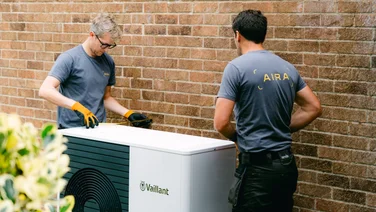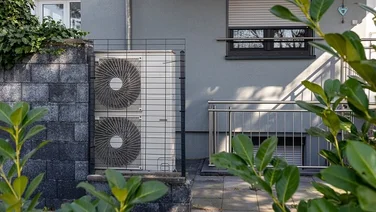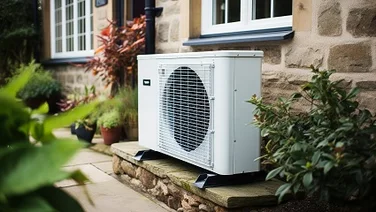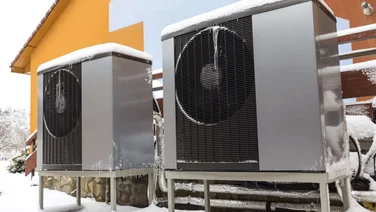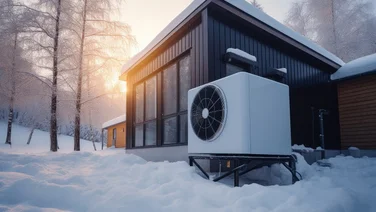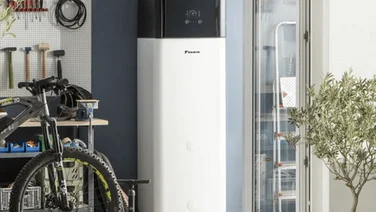We receive a small fee from trusted installers when you request a quote through our site. This helps us keep our content independent, well-researched and up to date – Learn more
- How does a hybrid air source heat pump work?
- Pros and cons of a hybrid air source heat pump
- Should you get a hybrid heat pump or a normal one?
- How much does a hybrid air source heat pump cost?
- Heat pump running costs
- What’s the best hybrid air source heat pump?
- How long does a hybrid air source heat pump take to install?
- Hybrid air source heat pump maintenance
- Next steps
- Hybrid air source heat pumps: FAQs
- In a hybrid air source heat pump system includes a backup boiler
- The air source heat pump provides 80% of the heating
- Hybrid air source heat pumps cost around £7,000 to £15,000
As the UK looks for greener solutions to heating our homes, the need to replace gas-powered boilers is growing. Despite the high upfront cost of heat pumps, hybrid air source heat pumps have grown in popularity over the past few years.
But what exactly are hybrid air source heat pumps, and how do they work to make UK homes greener? To help answer this, we’ve put together a comprehensive guide on everything you need to know about hybrid air source heat pumps.
If you’re already familiar with hybrid and air source heat pump costs, why not dive in and get yourself a quote for a new heat pump? We can make this process a million times easier with our simple comparison tool.
Once you’ve filled in a few details, our suppliers will be in touch with quotes for you to compare. You’ll find the right deal in no time.
What type of central heating do you currently use?
Get started
How does a hybrid air source heat pump work?
Whereas most home heating systems use fuel or convert electricity to heat a home, an air source heat pump works using the air outside and electricity.
It’s designed to integrate into the existing heating system, so it works with radiators, and can provide hot water.
Air source heat pumps don’t need warm air outside in order to function, they can draw residual heat from the air at temperatures as low as -25°C. This means air source heat pumps are completely viable in colder climates.
However, they have to work harder to heat the home when temperatures drop below 0°C, which is where a hybrid system comes into play.
If you’re interested in learning more about the best air source heat pumps in the UK, please read our dedicated guide.
With a hybrid air source heat pump, the standard boiler will quick in if the heat pump is struggling to heat your home, although the air source heat pump should still provide around 80% of the heating year round.
Pros and cons of a hybrid air source heat pump
- Works efficiently all year round in colder regions
- Can use gas as a backup in winter
- Provides clean home heating when outside temperature is optimal
- Ideal for poorly insulated homes where a purely air-powered heat pump wouldn’t work efficiently
- Low maintenance
- Reduces carbon footprint
- Helps reduce gas and oil consumption
- Longer life than traditional boilers
- Lowers energy bills
- Still reliant on fossil fuels, albeit less so
- Higher upfront cost than standard boilers
- Costly installation process, complicated by things like pipework location
- New technology; low adoption rate at present
- Currently limited numbers of experienced technicians
What type of central heating do you currently use?
Get startedShould you get a hybrid heat pump or a normal one?
Whether you choose to get a hybrid heat pump or a normal one depends entirely on your circumstances – including where you live, which we’ve mentioned briefly above. Because most air source heat pumps only heat homes up to around 40-45°C (104-113°F), older, more poorly insulated homes will struggle to keep warmth efficiently.
This is especially true when the temperatures outside drop below a certain threshold, because as it gets colder, air source heat pumps become less efficient. Sure, many heat pumps can continue to work in freezing temperatures, but the cold makes heating radiators far more difficult.
‘What size heat pump do I need?‘ is one of the most common questions people ask when they begin their clean energy journey. Find out which one you need by reading our dedicated guide.
It’s not helped either by the fact that many homes have smaller radiators designed for traditional gas-fired boilers. An air source heat pump requires larger radiators to distribute heat more efficiently; smaller radiators simply don’t work as well.
The advantage of a hybrid heat pump, then, is the ability to fall back on a gas-powered boiler when the conditions don’t allow an air heat pump to generate enough warmth.
They’re also an excellent stepping stone towards net zero, at least until technology improves to a point where non-hybrid heat pumps work efficiently in sub-optimal conditions.
If you live in an area where a normal heat pump will work well throughout the year, take a look at our list of the best air source heat pumps available on the market right now.
Are hybrid air source heat pumps suitable for all property types?
Hybrid air source heat pumps might not be suitable for all property types.
Homeowners who live in flats, or listed buildings for example, might not be able to install a hybrid heat pump. This is also the case when installing a regular air source heat pump.
In the case of flats, this is because they might not have anywhere to store the air source heat pump’s external unit, unless they have a large balcony.
Listed buildings, or properties in conservation areas, are subject to restrictions around making changes to the buildings outer appearance. This can make installing a hybrid heat pump more difficult.
Lastly, some properties might also not have the space to store both the air source heat pump’s internal unit, and a boiler.
How much does a hybrid air source heat pump cost?
Property size | Hybrid air source heat pump size | Hybrid air source heat pump cost |
|---|---|---|
Two-bedroom | 5 kW | £7,000 |
Three-bedroom | 10 kW | £10,000 |
Four-bedroom | 13 kW | £13,000 |
Five-bedroom | 16 kW | £15,000 |
A hybrid air source heat pump can cost anywhere from £7,000 to £15,000, depending on the size of the property.
Additionally, a new boiler costs around £4,000, although not everyone will need to replace their boiler when installing a hybrid heat pump system.
As you can see, hybrid air source heat pumps cost much more than boilers. However with the Boiler Upgrade Scheme, homeowners can get £7,500 towards the cost of a new heat pump.
With the Boiler Upgrade Scheme, a hybrid air source heat pump is cheaper than a gas boiler. Despite this, around 73% of people are not aware of the heat pump grant, according to our National Home Energy Survey.
Besides upfront costs, there’s also the issue of running costs.
Here’s a helpful chart showing the cost of running a standard gas boiler compared to a hybrid air source heat pump over 15 years (based on a semi-detached property occupied by two people):
Heat pump running costs
A ground source heat pump’s running costs for a three-bedroom household will typically come to around £939 per year.
The average air source heat pump will cost about the same, though this can vary significantly, depending on where you live in the UK.
| Heating method | Average monthly usage | Ofgem price cap 2025 | Standing charge | Monthly bill |
|---|---|---|---|---|
| Gas boiler | 960 kWh gas | 6.29p/kWh | 34.03p/day | £60.72 |
| Heat pump | 246 kWh electricity | 26.35p/kWh | 53.68p/day | £65.36 |
What’s the best hybrid air source heat pump?
As the technology is still quite new, the hybrid air source heat pumps available on the market are limited when compared to the plethora of boilers for sale. What is good though, is that many of the best-known boiler manufacturers have started selling hybrid air pumps, combining their boiler expertise with the new technology.
Take a look at the table below for our pick of the best hybrid air source heat pumps currently available on the market:
| Manufacturer | Model | Cost (approximate) |
| Valiant | aroTHERM hybrid air source heat pump (5kW, 8kW, 11kW, 15kW) | £5,900-£8,500 |
| Grant | Aerona³ R32 air source heat pump | £2,650-£5,350 |
| Daikin | 5kW or 8kW Altherma heat pump | £3,750-£4,200 |
How long does a hybrid air source heat pump take to install?
The process of installing a hybrid air source heat pump can differ according to your home’s heating setup.
For example, your pipework could be in an optimal location, which would make the installation process quicker (likelier in newer properties).
However, if the pipework is not in the right location, then it’s likely that you’d need to have new piping installed to accommodate the heat pump. This is more likely in older properties, which were designed around older forms of home heating.
Space is something you need to think about too. A hybrid air source heat pump will require space outside the property, with the pump mounted either onto a wall or positioned on the ground.
Just remember that having space for the unit is not enough; you will also have to make sure there is clearance around the heat pump so it can work properly. Wall-mounted pumps need around 200 mm as a minimum to function efficiently, whereas ground units tend to need a little more space.
Hybrid air source heat pump maintenance
In most cases, hybrid air source heat pumps are low maintenance and don’t require the comparatively frequent repairs needed for standard boilers. This is because the hybrid aspect means that the boiler is used far less, which has the obvious effect of reducing wear and tear on the unit.
A high-quality hybrid heat pump can last between 20-30 years, though it’s still advisable to get a checkup every year or so.
Despite this, there are still a few things you should do throughout the lifespan of your hybrid heat pump. These include:
- Checking the filters, coils, and fans and either cleaning or swapping them if necessary
- Making sure airflow isn’t hindered by leaves or other debris
- Keeping an eye on whether the heat pump is leaking (heat pumps collect and store condensation from the air that must be emptied every now and then)
Even considering the above, the essential parts of a hybrid air source heat pump are far less likely to degrade than those of a standard boiler.
Next steps
With the government aiming to reduce gas boiler installations by 80% by 2035, now is the time to consider a hybrid air source heat pump. They’re the perfect starting point for those looking to reduce their carbon footprint, without the worry of dropping a standard boiler entirely.
To compare free heat pump quotes, just pop a few details into our easy-to-use comparison tool – then put your feet up and let us do the hard work.
We’ll pass on your information to our suppliers, who’ll then be in touch shortly with free quotes for you to compare. You’ll be reaping the heat pump-powered rewards in no time!
Hybrid air source heat pumps: FAQs
Can you have a hybrid heat pump with an existing boiler?
Yes, you can keep your existing boiler with a hybrid heat pump. This type of system is sometimes called a ‘bivalent system,’ where the heat pump and boiler are connected through a buffer tank.
Are hybrid air source heat pumps worth it?
Hybrid air source heat pumps can be worth it if you live in an area where winter temperatures regularly go below -25°C, or if you’re not able to improve your home’s insulation or get larger radiators.
In all other cases, a regular heat pump should be enough to heat any well-insulated home.
How long do hybrid heat pumps last?
The air source heat pump portion of a hybrid heat pump will last 25-30 years. The boiler portion will last around 10 years.


